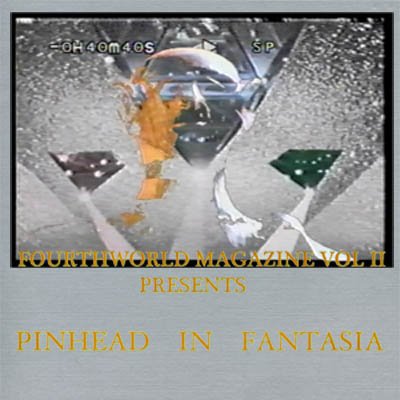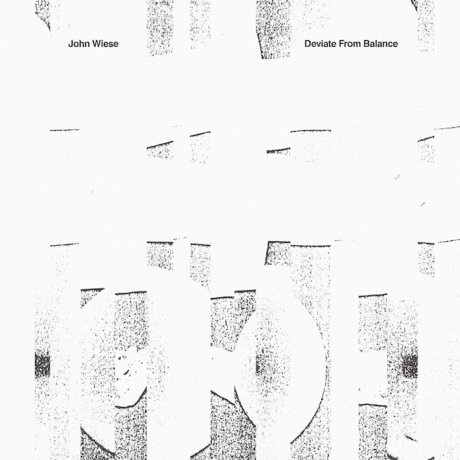For each year's first three quarters, we celebrate by sharing a list of our favorite music releases. Unlike our year-end lists, these quarter features are casually compiled, with an aim to spotlight the underdogs and the lesser-heard among the more popular picks. More from this series
Whether from an established channel (PC Music, Constellation, 1080p), a serendipitous hyperlink (Javier Estrada, Lolina, OG Maco), or through sheer market forces (Kendrick Lamar, Björk), our favorites from the first quarter of 2015 sketched out remarkably diverse aesthetics and bold conceptual modes. Some were political, some were inscrutable, and others were just easyFun, but when taken together, these releases not only perfectly embodied the sensory overload expected of our data stream, but also provided illusory structure for an otherwise dizzying tumult of sound. It felt right, then, that the 21 releases below ranged from a tampered batch of suite cake pop (GFOTY) and #latergram braggadocio (Drake) to anti-social hypnagogia (Fourth World Magazine) and self-mythologizing R&B (Dawn Richard): any semblance of order was as far-reaching as the sounds.
Before we get to the list proper, here are other favorites that didn’t make the cut: Bekele´ Berhanu’s Untitled, Arca’s Sheep, Katie Got Bandz’s Coolin’ in Chiraq, John T. Gast’s Excerpts, Oren Ambarchi’s Live Knots, Tara Sinn + Blues Control’s My Afterlife Is So Boring II, DJ Nigga Fox’s Noite E Dia, Eartheater’s Metalepsis, Jack Name’s Weird Moons, /f’s Micromental, Joanne Robertson’s Black Moon Days, Nicolas Jaar’s Pomegranates, DJWWWW + N. BRENNAN’s PSX-MEMORY-CARD: ENCOM LTD., Chief Keef’s Nobody, Jib Kidder’s Teaspoon To The Ocean, Natasha Barrett’s Peat+Polymer, Lawrence English’s Viento, Sam Prekop’s The Republic, Nidia Minaj’s Danger, Mark Templeton + Kyle Armstrong’s Extensions, Logos & Mumdance’s Proto, Foodman’s Couldwork, and Bryan Eubanks’s from the cistern.
Matana Roberts
COIN COIN Chapter 3: river run thee
[Constellation]

Matana Roberts needs voices: deep, bellowing, screaming, operatic voices — her own voice, her grandmother’s voice, voices for the people there will never be pictures of — because she wants to communicate an oral history. An oral history, of both fact and simultaneous experience, to process the immensity of racism, of slavery, of marginalization, of her ancestry, and to evoke the true range of emotions these things represent. Chapter 3 is easily the most arresting of her already hyper-diverse COIN COIN project, a dense and endless cycle of hallucinatory noise, saxophones, synths, field recordings, and Matana’s own voice overdubbed in real time like group glossolalia, given to wandering harmonies and random bursts of harshness, everywhere at once, so evocative of the human experience, fluid and plural, tense and afraid, but in control, like a mind recalling a painful memory. COIN COIN chapters 1 and 2 were both recorded live, and they were spirited, subversive works of art. But Chapter 3 behaves and feels truly alive, a living history on record breathing via loop pedal.
easyFun
Deep Trouble
[PC Music]

What is there left for us to say about PC Music? Probably nothing, but admittedly, easyFun’s Deep Trouble EP is something else. It’s the first time that PC Music has been thinkable as more than an idiosyncratic moment in information-age digital culture, as something larger and more sustainable. “Laplander” and “Fanta” feature lyricism with actual, unfeigned emotion, in fresh departure from the collective’s apparent paradigm of simulation. easyFun’s EDM is principled and, especially in the case of closer “Full Circle,” situated squarely on the dancefloor. As much as PC Music might feel like an answered question, a dotted “i,” forthcoming Hannah Diamond and GFOTY full-lengths as well as recent live permutations (QT is a real person?) are giving critics new points of interest where, admittedly, interest has seemed somewhat unsustainable as of late. No matter how bizarre and interesting things get for PC Music in 2015, we shouldn’t forget Deep Trouble, one of the most conceptually restrained yet successfully executed gestures to come from that corner of the web.
Fourth World Magazine
Vol. II: Pinhead in Fantasia
[Pacificity Soundvisions]

This anti-social hypnagogic triple threat, promising ART AND TEXT TO BLOW YOUR MIND, brought together Monopoly Child Spencer Clark, Telstar Pony David Keenan, and waste shaman A.R. Faust in order to redraw the outlines of Jon Hassell’s liminal sketches of a visionary, technologically-mediated world music. Where Hassell once sought to deconstruct the sensual/intellectual dichotomy he thought constitutive of the Western classical tradition, Fourth World Magazine confronts a social space where the difference between the actual and the virtual is increasingly confused. Clark’s ethereal sound sculptures — alternately prickly and smooth, ludic and liturgical — unleash the phenomenological intensities trapped within the virtual. If Hassell strove toward a “music for above and below the waist, simultaneously,” Pinhead In Fantasia reasserted the cold sweat physicality of high-concept performance.
John Wiese
Deviate From Balance
[Gilgongo]

Consider a clumsy and unlikely comparison: noise/musique concrète/tape auteur John Wiese and Chicago drill captain Lil Herb. Without contradicting or invalidating Will Neibergall’s excellent down-and-dirty comparative analysis of Deviate From Balance, what makes John Wiese’s soundscapes so enthralling from a purely visceral standpoint is exactly how he beckons you into his space, how he “[seeks] out the boundaries of materialism proper.” Much like Lil Herb did on 2014’s Welcome to Fazoland, Wiese grabs your inner ear skin by gunpoint, aggressively yet seductively fostering a physical connection between your headspace and his concrete environment. As much as Deviate From Balance is objectively/textually a reinterpretation of older works and an exploration of familiar places from different angles, what is perhaps most impressive and affective about his latest is that its “incidental veering off-course” knows no boundaries, and its appreciation (though certainly amplified by its roots in specific noise scenes) warrants thinking outside of its own tape deck. It is, as Neibergall asserted, “a portrait of a figure always already escaping from view,” but it is also a “moving” picture, as much “metacritical” as it is metamorphic in how it transcends its own particularities.
Kendrick Lamar
To Pimp a Butterfly
[Interscope/Aftermath/Top Dawg]

I know, right? As if a butterfly actually needed any deliberate “pimping.” It’s already the most amazingly ballin’-looking animal on the face of this hideous planet, for god’s sake! But hey, maybe that’s the idea? After the notoriety he steadily built with Section 80 and good kid, m.A.A.d city, Lamar hardly seems to need any help selling himself on To Pimp a Butterfly as one of the most adventurous yet comfy-in-his-own-aesthetic-skin artists working today. And it’s precisely this ease and nonchalance that allows each of the 16 genre-juggling, socially-engaged, and lyrically-challenging tracks presented therein to come of with such beauty and grace. But wait a minute, maybe I’m interpreting that title all wrong? Maybe “pimping” the butterfly is more a question of commodifying the thing’s innate beauty and exploiting it for money after the fact? Maybe our listless approval of “pretty things” is slowly and inexorably decaying the very meaning of their prettiness? Then again, when I think of it that way, it only makes the whole dubious mess even more essentially beautiful — not to mention that much more exciting.
Chicklette
Unfaithful
[Hundebiss]

Neighborhoods rewarding the antihero for slaying a den full of fiends; nobody ever questions the unfaithful. By definition, unfaithful is “not adhering to promises, obligations, or allegiances.” The word’s foundation stabilizes itself by relying on unreliability; inherently, being unfaithful is consciously contradictory and flawed. In comparison with the term based, unfaithful riots in a realm of lies and in-your-face shrugging that amounts to a glib, naive nihilistic purity. Not only does Chicklette broke-vocalize Unfaithful in a manner of lyrical abandonment, but it also aggressively tackles the desertion of belief with lackadaisical melodies, noises strewn and dropped-in throughout, and malicious deterioration of pop, all while retaining a mindset akin to never getting the name of that ravished body from last night. Your body. Chicklette’s Unfaithful is self-destruction because fuck meat and this body, your body; “Are you on the fucking PHONE, rn — like…” Most importantly, music doesn’t get this sort of ALPHA-FEMALE very often, or as much as it should be. And even though she makes it hard to joyfully celebrate, Chicklette is the (literal) care-free champion outsider, and Unfaithful is the crown she willfully adorns. To “turn back” only insinuates pre-destination, so leave or w/e.
D’Angelo and The Vanguard
Black Messiah
[RCA]

D’Angelo the wallflower, the grinning jester, the genius, the Hendrix disciple, the sexual icon, he who “used to get real high,” the redeemed — this man claimed that the title Black Messiah was “about the world.” Yet instead of slipping into the universalizing ether, instead of simulating a selection of styles to denote variety and virtuosity, D’Angelo the human being was wholly present for us. His voice stacked onto itself as a choir of falsetto reports and rejoinders. His guitar crunched through dense chordal riffs, spiraled into fried psych soloing, and whispered in gypsy jazz scales. His compositions unfolded detail by detail: the sudden onset of a knotty progression behind an established groove, handclaps fused at the hip with hi-hats, hiccups planted in willfully broken rhythms. All of this reached us at a benchmark level of production clarity. Other marquee releases of 2015 found Kendrick Lamar struggling to empower the marginalized in the face of commercial exploitation and social decay, Earl Sweatshirt exorcising his personal demons from within the vacuum of the studio, and Kanye West claiming that his forthcoming album would “embrac[e] joy […] in service of the people.” On Black Messiah, D’Angelo compressed his version of all of these narratives into a single album, and we, with mouths agape, swayed as we listened.
ZS
Xe
[Northern Spy]

Xe retells the fable of Jonah and the Whale, but instead of a cetacean, it’s the machine that’s swallowed him alive, and instead of him, it’s all of us. Trapped, disoriented, and alone, we’re forced to listen to ultra-rational circuits of steel guitar and the perpetual multiplications of an iron drum, losing ourselves in a boundless latticework that encloses us again and again in its totalitarian system. We struggle to escape, to claw our way out of its belly, but its sterile maxi-minimalism, its webbing of antiseptic guitar, chromium skins, and Sam Hillmer’s disarming sax, transform our every move into an extension of its own unfeeling structure. Yet just when we think all hope is lost, the machine’s own absolutist logic turns in on itself, recursively generating chaos out of order and unveiling the incoherence lurking beneath its coherent façade. It begins eating itself in a fit of senselessness, horns whelping discordantly as atonal cracks emerge in its perfect walls. At last, as the death throes subside, we break out, only to rush off in search of a superior machine to devour us all over again.
Javier Estrada
Tribal Prehispánico
[N.A.A.F.I.]

The Aztecs had two types of songs: devotional hymns and ghost chants, both used to contact the spirit world. In the latter, dancers would work themselves into a trance, becoming one with the gods and their ancestors before going into battle. Tribal Prehispánico, a work of Amerindian futurism in league with A la izquierda del colibrí, aims for a fusion of both. But while Jorge Reyes and Antonio Zepeda’s 1985 LP took a kosmische-influenced approach, Estrada follows Drexciya’s afro-futuristic route, using tribal — a DIY-friendly version of techno spliced with autochthonous sounds — as the foundation for a style that embraces Aztec cosmovision and comments on Latin America’s history of colonial subjugation. The album opens recounting the mythical foundation of Mexico, the Spanish Conquest, and mestizaje, until it reaches a contemporary-sounding interlude. Up to that point, future gradually emerged in the tracks, as tecciztli and teponaztli samples gave way to electronic beats, climaxing in the album’s final third, depicting a EDM-propelled confrontation between Aztecs and extraterrestrials. But we are in a sonidero now, witnessing human sacrifices reenacted in state-sanctioned narco executions, as Estrada performs his ghost chants. And we suddenly understand. In the XVI century, Aztecs fought aliens who looked like Queztalcoatl, though they were only human. America as we know it emerged from that clash. Yet, time is cyclical for the Aztecs, and just like their music’s ritualistic essence endures in tribal, Aztecs and aliens are bound to rematch. This is not science fiction fodder, as Estrada’s “Civilizations War” highlights, underlining the colonial/neo-colonial/intra-colonial tensions intrinsic to the Latin American experience. This time, the aliens are within, and in Tribal Prehispánico, Estrada devices a transtemporal place for the the perpetually-in-flux identity of the heirs of the original battle, to settle the score.
OG Maco
OG Maco [EP]
[Quality Control]

The OG Maco EP stole my girlfriend. The OG Maco EP went to my family reunion and now my parents want to adopt it. The OG Maco EP talked my boss into giving it a raise and cutting my pay. The OG Maco EP went on a ski trip with my friends and didn’t invite me. All of them, my friends and family, said, “Sorry, Taylor, it’s something about the way that Maco yelps and yawps and grinds his gravelly husk of a flow into the woozy production — it just really gets to us. The EP’s just packed with hits. ‘U Guessed It,’ of course, but ‘Seizure’ really bugs us out every time too, and ‘Heat,’ with that sick Zuse verse, is actual fire. For a 15-track long ‘EP,’ it really is amazing how every single song can bang so hard and still pack in constant surprises at the textural and production level, you know?” Friends and family, first off, thanks for writing my blurb for me. Second, I hear you! There’s not a day that goes by when I don’t find a stereo somewhere and crank this shit. But, I don’t know, call me sometime? Let’s have lunch.
Graham Lambkin & Michael Pisaro
Schwarze Riesenfalter
[Erstwhile]

No, no, no: night is a no. I can’t sleep, and I’ve never been a good sleeper, so I am staying up and listening to Schwarze Risenfalter again. Regardless of intent, the music elucidates the deep drift of insomnia: a slow restlessness that, inevitably, softens clenched jaws and loosens tight shoulders and dulls, long enough, the empty dark in a subtle, tragicomic relief. No, no, no: a vibrating cell phone, another YouTube clip, the sustained thud of a ghastly note. A voice upstairs, downstairs, somewhere. Lambkin and Pisaro, like sleeplessness, disrupt and disorient. This music upsets me, but I’m not ready to go to sleep — even if I tried. Somewhere in this “no,” I listen closely, and I am home.
Dawn Richard
Blackheart
[Our Dawn]

There can be no denying that Blackheart is the result of a fiercely independent vision. It distorts, it dismantles, it disrupts. The signs and signifiers of R&B are present and correct here — vocoders, 808s, synth washes, grandiose string sections — but with the assistance of producer Noisecastle III, Dawn Richard mutates and subverts them to establish her own gender-less, colour-less and genre-less worldview. By way of negative space, polyrhythmic beat programming, and densely layered instrumentation, Blackheart is at once daring and fully-formed, a studio experiment that succeeds largely because it doesn’t just upend the verse-chorus-verse methodology; it warps genre tropes and resists classification to a wildly self-mythologizing end in doing so. Indeed, following a veritable annus horribilis of breakups, bust-ups, and bereavements, Richard’s effort could’ve been viewed as a mere cog in a much wider narrative. Not so: rather, it is a narrative unto itself, one that sees her become Calypso, Billie Jean, and the phoenix in an autarchic song cycle of loss, discovery, and eventual (read: inevitable) triumph.
Drake
If You’re Reading This It’s Too Late
[Cash Money]

Instagram confirms that our society is even more obsessed with beauty and popularity than ever before. You’ve got to have the savvy — that Drake has — to be bold with social media, because making rap music in the age of a technocracy is an arms race. And to drop an album out of nowhere, like Beyoncé? Well, Drake can say that he did it. On If You’re Reading This It’s Too Late, he doesn’t so much take the listener on a journey with him as return from the journey, bragging, telling stories, tweeting tweets, and posting pics with the braggadocio of #latergram after #latergram. For Drake, making music is part hard work and part social media performance — and then life goes on, like a meme.
Lotic
Heterocetera
[Tri Angle]

BDSM is draped all over the ear-piercing, high-frequency drones and clanking shuddering percussion of Heterocetera, Lotic’s Tri Angle debut. But pain isn’t simply transformed into perverse pleasure here, nor is it revealed as simple performance. This is distinctly painful music, melodic lines unresolved and dripping with anxiety and nervousness, samples decaying and weeping, thickets of buzzing noise upending hastily erected structures. This pain is allowed to blossom as real pain, real fear, real urgency. And yet there’s pleasure here too, a masochism built on the letting go, the physicality of bodies stimulated into movement and interactive cohesion through what might once have been termed body music, the permanently delayed release that nearly becomes a hope through its reiterated status as a potentiality. Not a synthesis of the pleasure/pain binary, but a simultaneous stimulation of both with a distinctly contemporary affect, Heterocetera is ominous, thundering, enveloping, and seductive, a dance floor of discrete and specific units that eschews a numbing universality in favor of a productive, well, heterogenesis.
Amnesia Scanner
AS ANGELS RIG HOOK
[Gum Artefacts]

“Where is my mind?” call androgynous voices encrypted into a gram of DNA (777 terabytes of data). The illegibility of AS ANGELS RIG HOOK comes primarily from Jaakko Pallasvuo’s remarkable text, with images of torn cheeks, tigers in mid-leap tattooed underneath fingernails, of augmented reality contact lenses re-envisioning memories of minerals and paper money pre-apocalypse. Amnesia Scanner’s deft splicing techniques create mutant soundscapes that visually contain Jaakko’s text; the words are trapped in steel barrels filled with the liquified swill of 1,000 cyborg tears. As an “audioplay,” it’s hard not to compare the piece to the work of Ryan Trecartin. Demonic, disembodied voices chatter to create a fragmented narrative coded into drones providing high-speed Wi-Fi, Gregorian monks, or “Google Krishna.” When taken in one sitting, it’s a fascinating data-trip that pins the assumed semiosis occurring in “high-club” music to the wall, letting its images drip down into oceans of pitch-black oil and salty, contaminated Red Bull.
Jefre Cantu-Ledesma
A Year With 13 Moons
[Mexican Summer]

Jefre Cantu-Ledesma’s aesthetic on A Year With 13 Moons is a portmanteau of styles, reminiscent of the 1980s and yet unmoored and drifting in a way that can only signify its gestation in the present. The album attempts to fold aspects of his post-Love Is A Stream output — Conversations With Myself, Faceless Kiss, Songs of Remembrance — back into a single full-length set of compositions, but the artifact left in totality is far greater than what could be seen as first attempts at this style. The timbre of the LinnDrum as accompaniment on several tracks produces memories of my first encounters with it, wired into my brain since childhood because of Prince’s “When Doves Cry” and “Little Red Corvette,” while the aqueous guitar tone moves this work closer to The Cocteau Twins and Slowdive and away from Love Is A Stream and its My Bloody Valentine worship. Cantu-Ledesma has talked about this being his breakup album, and each time I hear the bombastic guitar swoon of “Love After Love,” I want to put my arm around him and tell him everything will be alright.
Moon B
Lifeworld
[1080p]

Wes Gray’s love of closed-door funk, retro-forward gear, and dollar-bin salvages knuckle up again as Moon B for label favorite 1080p. Lifeworld, Moon B’s first after a long run with Peoples Potential Unlimited, is far more sample driven than what you’d usually hear from Gray, whereas last year’s PPU releases — Moon B and II — don’t wander much from the smooth, late-night boogie heard throughout Moon B’s back catalog, The arrangement for the album changed too. Lifeworld ditches individual songs for a more fluid affair, distancing itself from a drum machine-driven production and drinking from a riverbed of vinyl cracks and warped sounds. Noted influences Delroy Edward’s Slowed Down Funk and “South Asian cinema clips” shape 30 minutes of loose, grainy shuffles overlapped like tattered a jigsaw. Gray’s love of physicality holds to more than wax or hardware heard through the tape’s hazy g-funk grooves; it gets us hot for what Moon B does next.
Food Court
Food Court
[Kye]

The cluttered din of parents and bored observers filing up the cramped amphitheater. Discussions and personal effects rustling as folding seats are unfurled, creaking under the put-upon weight. The orchestra members find their spot and begin to play. It’s an elementary style or informality that makes Food Court such an interesting force of non-composition. Side A is the warm-up, the intake of breath and the turning of pages as prevalent as the piece being played. Side B is the tear down, where the real fun of demystification begins. Like so many audiences, your focus gravitates toward the distractions. Those crinkles and coughs taking you out of the real beauty of fault. Food Court play with the challenge of expectations against results, so what plays out as little more than a local chamber ensemble practicing “Fumeux fume par fumée” is, in reality, a diversion. The real music isn’t the halting horns or the calm voice, but the spaces they create, the clicks and commotion the genius of Food Court. In a lesson always learned but quickly forgotten, it’s what you’re not hearing that should be the focal point. Everything else is to be ignored.
GFOTY
Cake Mix
[PC Music]

“G-F-O-T-Y.” Again proving to be one of the most nuanced and piercing of PC Music’s hyperactive, hyperreal experiments, GFOTY follows up TMT 2014 fav Secret Mix with another tampered batch of suite cake pop (locate nearest Starbucks). Sound delicious? Let’s do it! 1 cup 8-bit sunshine, 2 tsp disturbing noise, a pinch of strained exhalations. Blend with time- and pitch-shifting dry club mix until I want you to like me. The dis-affect will settle to the bottom, with HUGE sadness coming to the top in a way that was almost always Secretly obscured before. That brief glimpse at the in/difference between raw and artificial, when the huge sadness gets curved for a chiming smile of a song, is 20% of your daily saturated fat. Make sure to let the mix sit at 1-second intervals (just long enough to disrupt a sugary melody or plunge into another layer, deeper). By the time her <3-felt mis-appropriation of “All The Small Things” lands with massive bass synth and some self-same na na-na-na na-na na-nas, GFOTY has taken us beyond the realm of self-consciousness into a pleasurable no-stalgia-topia. Its 11 minutes are catchy, tragic, playful, biting, delicious — sign me up. The frosting is the mix’s bridal chorus finale — omg wait, it’s a wedding cake! Listen to GFOTY have it, eat it, cut right through it. Let’s do it!
Björk
Vulnicura
[One Little Indian]

It’s somewhat difficult for an American to write about Björk (an Icelander) and Arca (a Venezuelan) without alienating at least part of our international audience. The easy way around this would be to talk about the universality of deep emotional pain and vulnerability, how most all of us can relate to the helplessness of losing someone dear, how music that can truthfully, openly articulate these feelings in a way that’s both original enough to intrigue and familiar enough to identify with is a rare thing indeed. But fuck all that. We ain’t MoMA. Vulnicura is one of our favorite albums of 2015 so far, because in addition to what we said here, it brings to mind those ridiculously expensive Björk B-sides in the import section of Tower Records, because it feels like another important addition to Arca’s discography, and because something tells us Beavis & Butthead would approve.
Lolina
RELAXIN’ with Lolina
[Self-Released]

It’s funny that I’m summarizing this (relatively) surprise-release EP from Lolina (Inga Copeland), because what keeps me coming back to her music again and again isn’t an intuitive connection to her music or an intrinsic knowledge of its nature, but the mystery and unknowing that has persisted throughout her recorded career. Just like on her previous release, Lolina operates here in a zone as a producer/vocalist that seems not to belong to a particular time or place, but for her own singular, perplexing, fascinating world. It feels cheap to brand this release with an “outsider-art” perspective as some have, because Lolina seems completely aware of both where she fits into the world and how to subvert it in her own enigmatic way. I don’t think I’ll ever truly wrap my head around a single, well-defined impression of Copeland’s music, but I wouldn’t want to — and RELAXIN’ with Lolina is another crucial piece of (mis)information that dispenses with straightforward assumptions and instead offers a curious mystery.
For each year's first three quarters, we celebrate by sharing a list of our favorite music releases. Unlike our year-end lists, these quarter features are casually compiled, with an aim to spotlight the underdogs and the lesser-heard among the more popular picks. More from this series

